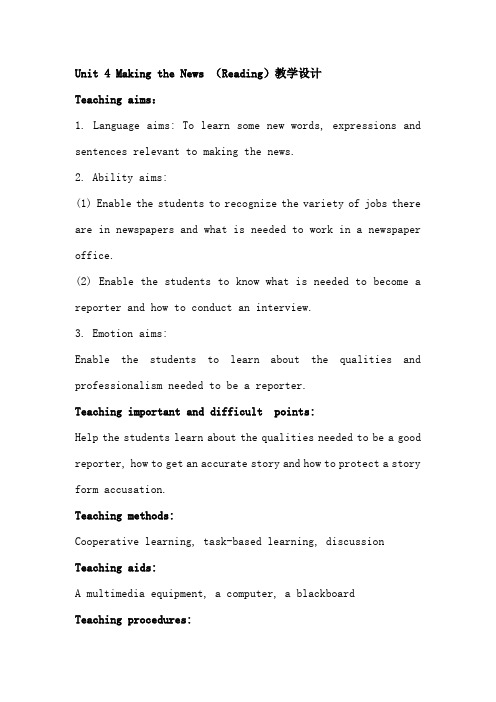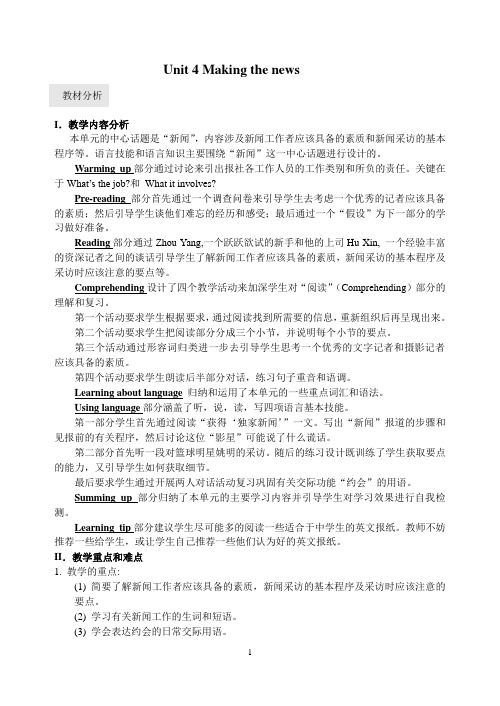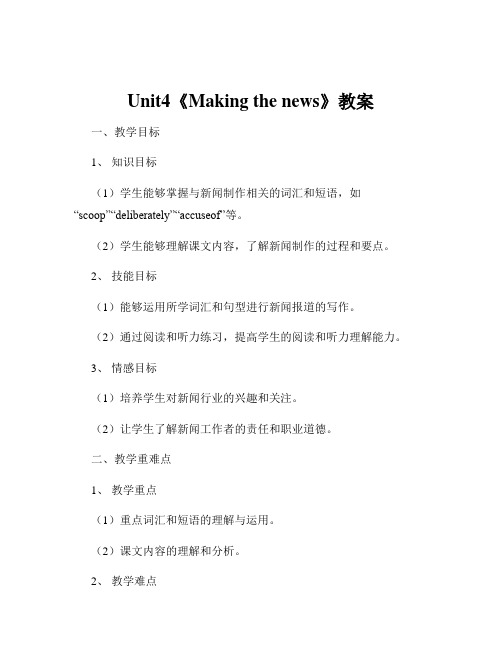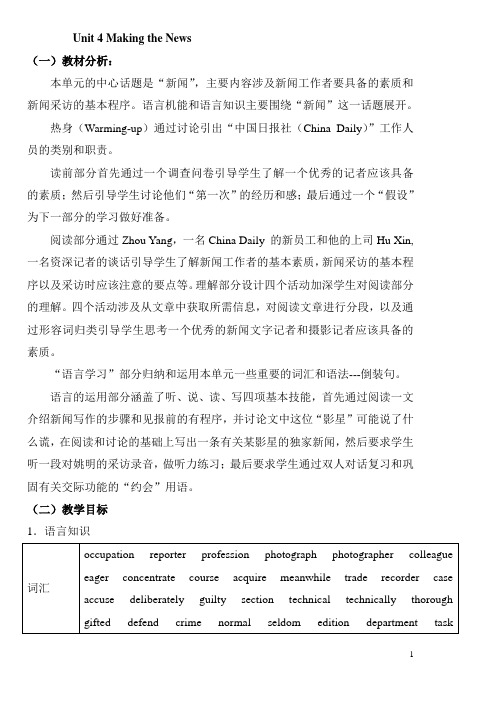Unit 4 Making the news 教学设计方案
高中英语_Book5 Unit4 Making the News教学设计学情分析教材分析课后反思

Unit 4 Making the News (Reading)教学设计Teaching aims:1. Language aims: To learn some new words, expressions and sentences relevant to making the news.2. Ability aims:(1) Enable the students to recognize the variety of jobs there are in newspapers and what is needed to work in a newspaper office.(2) Enable the students to know what is needed to become a reporter and how to conduct an interview.3. Emotion aims:Enable the students to learn about the qualities and professionalism needed to be a reporter.Teaching important and difficult points:Help the students learn about the qualities needed to be a good reporter, how to get an accurate story and how to protect a story form accusation.Teaching methods:Cooperative learning, task-based learning, discussion Teaching aids:A multimedia equipment, a computer, a blackboardTeaching procedures:Step 1 Lead-in1. Show a piece of news to the students.2. Show pictures of some people on the screen and ask the students to guess the jobs of them. (journalist, photographer, editor, designer, printer)3. Students turn their textbooks to page 26, read the title of the passage and find out the main characters quickly by scanning the passage.Step 2 SkimmingStudents skim the passage quickly and find out the main idea. (The qualities needed to become a good journalist.)Step 3 ScanningStudents are divided into seven small groups, scan the passage and finish the “True or False” questions.1. Zhou Yang needs a camera to become a good journalist. (F)2. A journalist needs to be curious.(T)3. A journalist shouldn’t be so talkative but should listen carefully.(T)4. A journalist should listen carefully while taking notes.(T)5. Zhou Yang has got a real scoop.(F)Step 4 Detailed reading1. Students read line 1-15 carefully and fill in the blanks.(1)The first time he will be put as an assistant to an experienced journalist.(2) There is no need for him to take a camera with him. He will have a professional photographer with him to take photographs.2. Students read line 16-29 carefully and fill in the blanks.(1) He needs to be curious.(2) A good reporter must have a “nose” for a story.(3) He has to listen for detailed facts.(4) If the interviewee agrees, he can use a recorder to get the facts straight.3. Students read line 30-41 carefully and finish the “True or False” questions.(1) Hu Xin ever had a case where somebody accused his journalists of getting the wrong end of the stick.(2) The footballer was accused because he lost the game. Step 5 SummaryHelp the students to summarize the main idea of each part as well as the whole passage.Part 1(line1-15): Welcome to work in a teamPart 2(line16-29): How to cover a story; dos &don’tsPart 3(line30-41): How to protect a story from accusationsStep 6 Homework1. Read the passage as fluently as you can, and practice reading it with your partner.2. Write a short passage with the title of “What Makes a Good Journalist?” in about 100 words.Reference words, expressions and sentences:1. experienced2. gifted3. curious4. professional5. patient6. creative7. high level of education8. work experience9. good communication skills10.enthusiasm for the job11. prepared to work long hours12. ability to work in a team13. A good journalist need to be…14. In order to get accurate news, a journalist should…15. Only if you… can you…16. One should keep in mind that…when going out to cover astory.学情分析:1、教学班级是一个普通理科班,虽然已进入高二年级,有了一定的语言基础和认知能力,但是大部分学生英语基础一般,有些学生对英语学习具有恐惧感。
高二英语:Unit4《Making the news》教案

新修订高中阶段原创精品配套教材:Unit4《Making the news》教案教材定制 / 提高课堂效率 /内容可修改: Unit4 "Making the news" lesson plan教师:风老师风顺第二中学编订:FoonShion教育:Unit4《Making the news》教案:unit4《making the news》教案(新人教版必修5)一. 全模块教学目标(teaching aims)1. 能力目标(ability aim)enable the ss to recognize the variety of jobs there are in newspapers and what is needed to work in a newspaper office.enable the ss to know what is needed to become a reporter and how to conduct an interview.2.. 语言目标(language aim)重点词汇和短语occupation, update, submit, cover, concentrate on, inform, publish, polish, approve, acquire, accuse…of, so as to, scoop, deadline, depend on, ahead of, assess, demand, process 重点句子1)never will zhou yang forget his first assignment at the office of a popular english newspaper.2)you’ll find your colleagues very eager to assist you, so youmay be able to concentrate on photography later if you’re interested .3)not only am i interested in photography, but i took an amateur course at university to update my skills.4)only if you ask many questions will you acquire all the information you need to know.5)we say a good journalist must have a good “nose” for a story.6)meanwhile you have to prepare the next question depending on what the person says.7)have you ever had a case where somebody accused your reporters of getting the wrong end of the stick?8)perhaps i too will get a scoop!aids: multimedia facilities, tape-recorder, photos, diagrams二. 教学重难点(teaching important points)know what is needed to become a reporter and how to conduct an interviewmaster the use of inversion.三. 教学方法(teaching method)fast reading; task-based method & discussion四. 教学步骤(teaching procedure)period iiistep i check the homework and the recitation etc.step ii finish off the text of reading on p26 and deal the language points,1. acquirevt. (经由努力而) 获得,学得<知识、学问等=to get by one's own efforts:取得,获得:通过自我努力获得:acquire proficiency in math. 在数学上达到熟练水平acquire knowledge/ information, etc.2.have a good nose for sth = have an eye for …/ have an ear for .. 有眼光/ 对..感兴趣she has an ear for music .a good reporter has a nose for news . 对……嗅觉灵敏3.assess = make a judgement about a person or situation after thinking carefully about it评定;判断4.meanwhile adv = in the meanwhile / in the meantime / at the same time5.skeptical = a. 怀疑的= tending to doubt or not believe what other people tell youmary is sceptical about the solution. 玛丽对这个解决办法表示怀疑。
高中英语 Unit 4 Making the news教案

Unit 4 Making the news教材分析I.教学内容分析本单元的中心话题是“新闻”,内容涉及新闻工作者应该具备的素质和新闻采访的基本程序等。
语言技能和语言知识主要围绕“新闻”这一中心话题进行设计的。
Warming up部分通过讨论来引出报社各工作人员的工作类别和所负的责任。
关键在于What’s the job?和What it involves?Pre-reading部分首先通过一个调查问卷来引导学生去考虑一个优秀的记者应该具备的素质;然后引导学生谈他们难忘的经历和感受;最后通过一个“假设”为下一部分的学习做好准备。
Reading部分通过Zhou Yang,一个跃跃欲试的新手和他的上司Hu Xin, 一个经验丰富的资深记者之间的谈话引导学生了解新闻工作者应该具备的素质,新闻采访的基本程序及采访时应该注意的要点等。
Comprehending设计了四个教学活动来加深学生对“阅读”(Comprehending)部分的理解和复习。
第一个活动要求学生根据要求,通过阅读找到所需要的信息,重新组织后再呈现出来。
第二个活动要求学生把阅读部分分成三个小节,并说明每个小节的要点。
第三个活动通过形容词归类进一步去引导学生思考一个优秀的文字记者和摄影记者应该具备的素质。
第四个活动要求学生朗读后半部分对话,练习句子重音和语调。
Learning about language 归纳和运用了本单元的一些重点词汇和语法。
Using language部分涵盖了听,说,读,写四项语言基本技能。
第一部分学生首先通过阅读“获得‘独家新闻’”一文。
写出“新闻”报道的步骤和见报前的有关程序,然后讨论这位“影星”可能说了什么谎话。
第二部分首先听一段对篮球明星姚明的采访。
随后的练习设计既训练了学生获取要点的能力,又引导学生如何获取细节。
最后要求学生通过开展两人对话活动复习巩固有关交际功能“约会”的用语。
Summing up部分归纳了本单元的主要学习内容并引导学生对学习效果进行自我检测。
[教案]Unit4MakingtheNews (4)
![[教案]Unit4MakingtheNews (4)](https://img.taocdn.com/s3/m/88d6f6a31b37f111f18583d049649b6648d70984.png)
Unit4 Making the News【教材分析】本单元的中心话题是“新闻”。
话题依附于热身、阅读、语言学习、语言使用、听力、口语与写作等语言载体中。
内容涉及新闻工作者应该具备的素质、制作新闻的基本程序以及报纸和电视节目。
“热身”(warming up)局部通过讨论将来想从事的工作,使学生理解多种职业类别,协助学生理解报社工作人员的各种类别和所需承担的职责。
重点在于“types of jobs”和“What is involves?”“读前”(Pre-reading)局部通过调查问卷引导学生思考他们眼中优秀的新闻记者应该具备的素质,为文章涉及的内容“What is needed to become a good reporter?”做了铺垫。
学生通过讨论他们人生中各种“第一次”的经历和感受,为下一局部阅读的展开做了准备。
“阅读”(reading)局部通过周阳---一位刚刚走上新闻工作岗位的记者和他的上司胡星---一位经验丰富的资深新闻工作者之间的对话,通过阅读,引导学生理解并意识到作为新闻工作者应该具备的素质、新闻制作的基本程序以及新闻工作者在采访过程中应该注意的细节要点。
通过阅读局部所设计的一些教学活动来协助学生加深对文章内容的理解。
“语言学习”(learning about language)局部归纳和使用了本单元的重点词汇和短语。
协助学生分析和掌握倒装句的语法项目。
“语言使用”(Using language)局部包含了读、听、说等基本语言技能。
第一局部学生通过阅读“获得独家新闻”,一方面理解新闻写作的基本步骤和新闻制作的相关程序,另一方面学生通过想象来讨论文中所提到的“著名影星”可能说的谎言,在此基础上引导学生象周阳一样写出一篇关于此“著名影星”的独家新闻。
第二局部是周阳想采访刘明关于他去国外工作的决定,和刘明的助手商谈安排采访刘明的对话。
通过练习来协助学生获取要点和细节,提升他们听的水平。
Unit4《Making the news》教案

Unit4《Making the news》教案一、教学目标1、知识目标(1)学生能够掌握与新闻制作相关的词汇和短语,如“scoop”“deliberately”“accuseof”等。
(2)学生能够理解课文内容,了解新闻制作的过程和要点。
2、技能目标(1)能够运用所学词汇和句型进行新闻报道的写作。
(2)通过阅读和听力练习,提高学生的阅读和听力理解能力。
3、情感目标(1)培养学生对新闻行业的兴趣和关注。
(2)让学生了解新闻工作者的责任和职业道德。
二、教学重难点1、教学重点(1)重点词汇和短语的理解与运用。
(2)课文内容的理解和分析。
2、教学难点(1)如何引导学生将所学知识应用到实际的新闻写作中。
(2)让学生理解新闻工作中的道德和伦理问题。
三、教学方法1、任务型教学法通过布置各种任务,如阅读、写作、讨论等,让学生在完成任务的过程中掌握知识和技能。
2、情景教学法创设新闻制作的情景,让学生身临其境,更好地理解和掌握教学内容。
3、合作学习法组织学生进行小组合作学习,共同完成任务,培养学生的合作精神和沟通能力。
四、教学过程1、导入(1)通过展示一些著名的新闻图片或视频片段,引起学生对新闻的兴趣。
(2)提问学生对新闻制作的了解程度,引导学生思考新闻是如何产生的。
2、词汇学习(1)讲解课文中的重点词汇和短语,如“scoop”“deliberately”“accuseof”等,通过例句让学生理解其用法。
(2)组织学生进行词汇练习,如填空、造句等,巩固所学词汇。
3、课文阅读(1)让学生快速阅读课文,了解课文的大意。
(2)提出一些问题,如“What is the main idea of the text?” “Who ar e the main characters in the text?”等,检查学生的阅读理解情况。
(3)详细分析课文,讲解课文中的重点句子和段落,帮助学生深入理解课文内容。
4、听力练习(1)播放课文的录音,让学生边听边跟读,提高学生的听力和口语水平。
Unit4Making the News 教案

Unit 4 Making the News(一)教材分析:本单元的中心话题是“新闻”,主要内容涉及新闻工作者要具备的素质和新闻采访的基本程序。
语言机能和语言知识主要围绕“新闻”这一话题展开。
热身(Warming-up)通过讨论引出“中国日报社(China Daily)”工作人员的类别和职责。
读前部分首先通过一个调查问卷引导学生了解一个优秀的记者应该具备的素质;然后引导学生讨论他们“第一次”的经历和感;最后通过一个“假设”为下一部分的学习做好准备。
阅读部分通过Zhou Yang,一名China Daily 的新员工和他的上司Hu Xin, 一名资深记者的谈话引导学生了解新闻工作者的基本素质,新闻采访的基本程序以及采访时应该注意的要点等。
理解部分设计四个活动加深学生对阅读部分的理解。
四个活动涉及从文章中获取所需信息,对阅读文章进行分段,以及通过形容词归类引导学生思考一个优秀的新闻文字记者和摄影记者应该具备的素质。
“语言学习”部分归纳和运用本单元一些重要的词汇和语法---倒装句。
语言的运用部分涵盖了听、说、读、写四项基本技能,首先通过阅读一文介绍新闻写作的步骤和见报前的有程序,并讨论文中这位“影星”可能说了什么谎,在阅读和讨论的基础上写出一条有关某影星的独家新闻,然后要求学生听一段对姚明的采访录音,做听力练习;最后要求学生通过双人对话复习和巩固有关交际功能的“约会”用语。
(二)教学目标1.语言知识2.语言技能3.学习策略4.教学的重点和难点(1)重点1)了解新闻工作者的基本素质,新闻采访的基本程序以及采访时应该注意的要点等2)学会约会3)语法项目---倒装句4)了解新闻写作的步骤和见报前的有程序5)让学生初步学会运用所学的新闻报导的知识进行新闻文章写作(2)难点1)让学生归纳出新闻工作者的基本素质2)让学生灵活运用功能用语进行约会场景交流3)让学生初步学会写新闻报道文章(三)教学安排Period 1: Warming up (p25); Listening (p62)Period 2: Reading (p26); Comprehending (p27)Period 3: Discovering useful words and expressions (p27-28)Period 4: Discovering useful structures (p29) ;Using structures (p.64)Period 5: Reading and writing (p30-31)Period 1Teaching Contents: Warming up (p25); Listening (p62)Teaching proceduresStep 1 Lead-inWhere can we get the news from all over the world?Step 2 PresentationSuppose you were to be a journalist for China Daily, do you know what kind of jobs they have?Answer the questionsQ1: How many different kinds of jobs do newspapers have?Q2: What do these jobs involves?Q3: Do you know how to make the news? What’s the process?Step 3Talking1. If you want to be a good journalist, what qualities do you think you need to have?2. Divide the students into two groups to do an interview, one interviewee is Zhang Ziyi, another one is Yao Ming.After the interview, ask the students to answer the questions: What is your biggest problem to become a journalist? How can you change it?Step 4 ListeningListen to the story about Greg’s telephone interview and see whether h e had the same problems as you discussed.Period 2 ReadingTeaching contents: Reading (p26; Comprehending (p27)Teaching proceduresStep 1 Word preparationDelighted, colleague, assist, concentrate on, dilemma, submit, amateurStep 2 Lead-in1. Show some pictures of famous reporters2. How do they feel as a famous journalist?3. How would a new journalist feel to his first work assignment? (unforgettable) Step 3 SkimmingStep 4 ScanningLet’s read each part and find out more details in each part.Step5 ComprehendingStep 6 Idioms ExplanationStep7 Language difficultiesPeriod 3 Learning about languageTeaching contents: Discovering useful words and expressions (P27-28) Teaching procedures:Step 1 Discovering useful words and expressions1. In the reading passages several expressions are used in an idiomatic way. Findthem and fill in the chart.2. Complete Sentence B using a word or phrases from the reading passage which has and opposite meaning to the words underlined in the Sentence A3. Complete this passage using the words below in the correct form.Step2 Words studyPhrases:1.go out on a story 2. take photographs 3. be eager to do.. 4. take an amateur course 5.update my skills 6. depend on 7.accuse…of … 8. score goals 9. so as to.. 10.deny doing..Step 3 HomeworkPeriod 4 GrammarTeaching contents: Discovering useful structures (p. 29); Using structures (p.64) Teaching proceduresStep 1 Lead-in1. ---I don’t like the hair style.---Neither do I.2. Only when I took the plane did I first see the beautiful air hostess.3. Here comes a modern model with a long black dress.Step 2 Discovering1. Find the sentence using inversion in the reading passage.2. Rewrite the sentences using normal word order.(EX2 P29)3. Rewrite the sentences using inversion. (EX3 P29)4. Sentence making(EX 4 P29)1) Only after ______________ did______________.2) Not once did ____________________________.3) Seldom have I ____________________________.4) Only by doing _____________ could _______ .5) Only in a ____ can _______________________.6) Not once did _____________________________ .7) Only then did ____________________________.Step3 SummaryStep 4 PracticeStep 5 HomeworkReview the grammar focus and finish the exercises on page 64.Period 5 Reading & WritingTeaching contents: Reading and writing (p14-16)Teaching proceduresStep 1Word studyStep 2 Lead-inAs a reporter, Zhou Yang was eager to get a scoop. Now comes the chance. Let’s go to the text “ Getting the Scoop”Step 3 Reading1. What is the scoop about?2. What should be done before the scoop appear in the newspaper?3. How should be a good article like?Step 4 Language pointsStep 5 WritingLearn to write a news report.。
《Unit 4 Making the News》(Reading)教学设计
Unit 4 Making the News (Reading)教学设计Teaching aims:1. Language aims: To learn some new words, expressions and sentences relevant to making the news.2. Ability aims:(1) Enable the students to recognize the variety of jobs there are in newspapers and what is needed to work in a newspaper office.(2) Enable the students to know what is needed to become a reporter and how to conduct an interview.3. Emotion aims:Enable the students to learn about the qualities and professionalism needed to be a reporter.Teaching important and difficult points:Help the students learn about the qualities needed to be a good reporter, how to get an accurate story and how to protect a story form accusation.Teaching methods:Cooperative learning, task-based learning, discussionTeaching aids:A multimedia equipment, a computer, a blackboardTeaching procedures:Step 1 Lead-in1. Show a piece of news to the students.2. Show pictures of some people on the screen and ask the students to guess the jobs of them. (journalist, photographer, editor, designer, printer)3. Students turn their textbooks to page 26, read the title of the passage and find out the main characters quickly by scanning the passage.Step 2 SkimmingStudents skim the passage quickly and find out the main idea. (The qualities needed to become a good journalist.)Step 3 ScanningStudents are divided into seven small groups, scan the passage and finish the “True or False” questions.1. Zhou Yang needs a camera to become a good journalist. (F)2. A journalist needs to be curious.(T)3. A journalist shouldn’t be so talkative but should listen carefully.(T)4. A journalist should listen carefully while taking notes.(T)5. Zhou Yang has got a real scoop.(F)Step 4 Detailed reading1. Students read line 1-15 carefully and fill in the blanks. (1)The first time he will be put as an assistant to an experiencedjournalist.(2) There is no need for him to take a camera with him. Hewill have a professional photographer with him to take photographs.2. Students read line 16-29 carefully and fill in the blanks.(1) He needs to be curious.(2) A good reporter must have a “nose” for a story.(3) He has to listen for detailed facts.(4) If the interviewee agrees, he can use a recorder to get the facts straight.3. Students read line 30-41 carefully and finish the “True or False” questions.(1) Hu Xin ever had a case where somebody accused his journalists of getting the wrong end of the stick.(2) The footballer was accused because he lost the game.Step 5 SummaryHelp the students to summarize the main idea of each part as well as the whole passage.Part 1(line1-15): Welcome to work in a teamPart 2(line16-29): How to cover a story; dos &don’tsPart 3(line30-41): How to protect a story from accusations Step 6 Homework1. Read the passage as fluently as you can, and practice reading it with your partner.2. Write a short passage with the title of “What Makes a Good Journalist?” in about 100 words.Reference words, expressions and sentences:1. experienced2. gifted3. curious4. professional5. patient6. creative7. high level of education8. work experience9. good communication skills10.enthusiasm for the job11. prepared to work long hours12. ability to work in a team13. A good journalist need to be…14. In order to get accurate news, a journalist should…15. Only if you… can you…16. One should keep in mind that…when going out to cover a story.。
Unit4Makingthenews设计
2)What mistakes must he avoid?
3)How did Zhou Yang feel on his first day at work?
2.Ask the Ss to pay attention to the way the questions develop in the dialogue (Explain to them that all of these questions are finding out more about the qualities and skills needed for the job)
Reading
1.Fast reading. Ask the Ss to go through the whole passage as fast as they can and try to find answers to the following questions.
(Shown oBiblioteka the blackboard)板
书
设
计
Unit 4 Making the news
reporter/ journalist editor photographer critic
designer foreign correspondent
教学反思
教学设想
教法及
教学课时
Cooperative learning, task-based learning, fast-reading
One period
学法
Different forms of activities, including pair work, group work, competition, and quiz.
Unit4Makingthenews教案
Unit4Makingthenews教案unit 4 making the news教案unit 4 making the newsperiod 1&2 warming up and readingteaching aims:1.enable the students to talk about the qualities needed to be a good reporter and how to conduct a good interview2. enable the students to learn some reading strategies3. enable the students to learn the necessary qualities in their future job important points and difficult pointslearn about how to be a good reporterteaching methodsstrategic reading method; task-based methodteaching procedures:i. elaboration (warming up): help the students to relate their known knowledge to the topic that will be learnedtask 1 :( group discussion) talk about jobs in china daily?types of jobswhat it involvesreportertask2: predict what is going to be learned by looking at the title of the text. which type of job will be talked about in the text?ii. prediction (pre-reading):task 3: predict the main idea of the text by discussing the following questions:1. what are the qualities a good news reporter needs to have?(have group discussion first and then finish part 1 individually)2. what your first day at school was like? how would you feel on your first day at work? (group discussion)iii. skimming, scanning, analyzing (reading & comprehending)task 4: read the text quickly to get a general idea of the text.task 5: divide the passage into three sections and match the following main ideas to the three sections:how to get an accurate storyhow to protect a story from accusationshow to become a reporterthe skills neededthe importance of listeningstages in researching a storyhow to check factshow to deal with accusations of printing lieswork in a teamtask 6 read quickly to find out the information to fill in the form below task 7: tell what is required for a reporter and a photographer patient; imaginative ; well-organized; technically good; polite; concise; thorough; creative; curious; careful; gifted; professionala reporter a photographeriv. summarizingtask 8: write a summary of the textv. assignmentread an english newspaper and retell the main idea of one article in it.period 3&4 words & expressions共7页,当前第1页1234567 teaching aims:get the students to know how to use some words and expressions correctly and appropriatelyimportant points and difficult pointsuse some words and expressions correctly and appropriatelyteaching methodsdemonstrating and summarizing; practicingteaching procedures:1. occupation n.1). teaching is my occupation. 职业2). swimming is my occupation. 使…忙碌的事情;消遣occupy v.occupied=busyoccupy oneself in/with sth.employment; occupation; job; profession; vocation; work; tradehe is looking around for .: artisthe is out of .she chose teaching as her .she’s a lawyer by .he’s a carpenter by .2. assign v.assignment n.she gladly accepted the assignment. (分派的任务;工作)the english assignment is a book report. (课外作业,功课) 3. on one’s ownof one’s ownfor one’s ownwe should complete the test _________4. experienced adj.be experienced in/at sth/doing sth.who is experienced in cooking in your home?5. the first/last time + 时间状语从句the first time i came here, i was not used to the climate here. cover n. 封面,掩盖(物) ;v.1). tom will covered the outbreak of the disease.2). the road was covered with snow.3). she laughed to cover her worry.4). the red army covered about 30 miles a day.5). is the money enough to cover the cost of a new shirt?7. be eager for sth. (sucess)to do sth.that clausehe is eager to see his daughter.we are eager that the project should be started early共7页,当前第2页1234567be anxious about =be worried about8. concentrate on sth./doing sth.we should concentrate on our study.tom is concentrating on fishing.9. of +抽象名词(importance; value; use; help; benefit)of special interest=of no use=the meeting is of great importance.=each minute is _____ for us.of greatly valuablegreat valuableof great valuefor much value10. acquire; get; gain1). i sat in the front of the bus to ___ _ a good view of the countryside.2). gradually we _______ experience in how to do the work.3). they _____the victory after a bloody battle.11. have a nose for 嗅觉灵敏she has an ear for music. 有鉴赏能力she has an eye for color and style in clothes. 有眼光12. meanwhile=in the meanwhile=in the meantime=at the same timemother went shopping; meanwhile, i cleaned the house 13. trade n. v.1). japan does lots of trade with the united states.2). he is a shoemaker by trade.3). she trades 3 apples for some bananas.14. trick1). 窍门,手法2). play a trick(joke)on sb.=make fun of sb. (玩笑,恶作剧)3). he got into the building by a trick (诡计,花招)15. challenge1).he challenge my view on that matter.2).to finish the job in 2 days was a real challenge.16. supportn. 1).i need your support.v. 1)为…提供证据,证实2)the old man entered the room supported by his grandson.3). he has always supported the weaker party.4). he has a large family to support.17. case1).he thought he had solved the problem , but that was not the case.2).here is a case of being careless.3).we will look into that case.in case of sth. 如果,万一…in that/this case 在那样/这样情况下in no case 决不in case + 从句以防;可能;倘若共7页,当前第3页1234567 take an umbrella in case it rains.(in case 从句常用一般现在时表将来, 或should+do)17. accuse sb. of sth.=charge sb. with sth.tom ____ his boss of having broken his word.blamedaccusedchargedscolded18. so as to do sth. 只能在句末= in order to do sth.=so that + 从句= in order that + 从句i got up at five so as to catch the train=19. admitadmit doing /having doneadmit sb. into/to (the university)lily finally admitted___ my umbrella by mistake. to taketo have takenhaving takenhave taken20. n. adj.profession professional 具有….特点finish ex 3 on page 29assignmentfinish ex1 and ex 2 on page 28 and ex 3 on page 29 (discovering useful words and expressions)finish ex 2 , ex3 on page 63 and ex4 on page 64 (using words and expressions) in workbook.period 5 grammarteaching aims:get the students to use “inversion”correctly and appropriately important points and difficult pointsuse “inversion”correctly and appropriatelyteaching methodstask-based method; demonstrating; discussion; summarizing; practicing teaching procedures:i. presentationtask 1: comprehend the following sentencesonly then did i begin my work on designing a new bridge.=i began my work on designing a new bridge only then.2. not only was there a christmas tree, but also exciting presents under it. =there was not only a christmas tree, but also exciting presents under it.inversion: 起强调作用ii. analyzing & summarizingtask 2: find 4 examples of inversion in the reading passage1. never will zhou yang forget his first assignment at the office of china daily.2. only when you have seen what he or she does, can you cover a story by yourself.3. not only am i interested in photography, but i took a course at university.4. only if you ask many different questions will you acquire all the information you need to knowtask 3: analyze the sentences above and summarize the rules1. why can these sentences use inversion ?2. how are these inverted sentences made?※否定副词no;not;hardly, little, seldom, never, no sooner…than, no more, not only, only 等开头的句子要部分倒装。
Unit4Making the news教案
Unit 4 Making the news“Unforgettable”,says new journalistI.Teaching important points1.Let students talk about jobs in newspapers and what is needed to work in a newspaper office.2.Get students to read the passage and understand it.3.Have students learn different reading skills.II. Teaching difficult points1.Develop students’reading ability.2.Enable students to talk about what is needed to work in a newspaper office.III. Teaching aims and demandsLanguage aims:1.Get students to learn the useful new words and expressions in this part.2.Have students read the passage and know about zhouyang’first work assignment.Ability aims:1.Develop students’reading ability and let them learn different reading skills.2.Enable students to talk about jobs in newspapers and what is needed to work in a newspaper office.Emotional aims:1.Stimulate students’ interest in newspapers and the basic procedure of making the news.2.Develop students’sense of cooperative learning.Teaching aims:1.Enable the students to recognize the variety of jobs there are in newspapers and what is needed to work in a newspaper office.2.Enable the students to know what is needed to become a reporter and how to conduct an interviewee.3.Train the students’reading ability(skimming,detailed reading).Teaching procedure:Step 1.Lead-inThere are many kinds of occupations in the world, so which one do you want to choose? Step 2. Fast readingRead the text in 1 minute, and find out all the questions Zhou Yang asked.Step3.SkimmingRead and answer1.Where did the conversation happen?________________________________________________________________________ 2.Who were talking?________________________________________________________________________3.What does the reading passage mainly talk about? (a multiple choice)A.The skills necessary to become a good reporterB.The skills necessary to become a good photographerC.How to conduct a good interviewD.Being carefully in the new environmentE.A and CStep4.Careful readingWe can divide the passage into three parts according to the duties of a journalist.Part1.___________________________________________________________________Part2.___________________________________________________________________Part3.___________________________________________________________________ Part 1:(From the beginning to“Good”)1.When can a new journalist cover a story by himself?___________A. Never can a new journalist cover a story by himself.B. Only after he has seen what an experienced journalist does.C. Not until he is old enough .D. Only when he takes a camera with him.2.Zhou Yang took a course of photography at mid-school.(T/F)3.What a new journalist should do on the first day?(1). First he will be put as an assistant to an____________________________________(2).____________________________ him to take a________ with him. He will have a professional ____________ with him to take photographs.Part2.(From“What do I”to“support your story”)(1)While interviewing, the journalist would just ask the questions prepared in advance(预先).(T/F)(2)What a journalist needs to remember when going out to cover a story?a.He needs to be _________.b.A good journalist must have a good“_____”for a story.c.He has to listen for the _____________.d. If necessary, he can prepare a________ to make sure that he gets all the facts straight.Part 3 :(From “I see!”to the end)(1). The footballer admitted he took the money(T/F)(2).Zhou Yang is very eager to cover a story .(T/F)(3)The footballer was thought to be guilty because_______ .A. He usually told lies.B. He stopped the reporter publishing an article.C. He took money for deliberately not scoring goals so as to let the other team win.D. He bribed another football team.prehending(1)Zhou Yang’s notesSkills——◆We need to be _______ .◆To____all the information we need to know, we have to ask many different______ .◆To be a good reporter, we must have a “____ ”for a story.◆When we find people are not _______ , we must find out the missing partsof the ______ .Tips——Dos:◆______ to the answers carefully.Don’ts:◆Don’t be _____.◆Don’t talk too much ourselves.(2)Choose the correct explanation to the phrasesa.1 what do I need to remember when I go out to cover a story.( )A. tell a storyB. write storyC. send a storyD. report a storyb. A good journalist must have a good “nose”for a story.( )A. know what has happened.B.be able to “smell”the truth when somebody is telling part of it.C. be able to discover the whole truth by doing research.D. B and Cc. This is a trick of the trade.( )A. something that cheats somebodyB. something that helps you do the job in a professional way.C. something used to hide secrets.d.We sometimes use small recorders to make sure that we get all your facts straight.( )A. to make sure that the story is accurateB. to get the facts directlyC. to get the things speciallyStep 6.Post-reading——SummaryTo the journalists, there is no ______ for them to take a camera because they have professional ___________ with them. The journalists should be ________ and they must have a good _____ for a story. They know how to _______the information they need. While interviewing, they won’t be _____, they won’t_____ too much, and they ____ ___ the interviewee carefully. They will listen to the _______ facts and ask new questions. There is a trick of the _____, that is, with the permission of the interviewee, they would use a ________ which could keep the evidence to help __________their story.Step 7.Discussion(1)What is news?(2)Practice –interviewingStep 8.HomeworkFinish the exercise in«世纪金榜»P45 1,2,3.。
- 1、下载文档前请自行甄别文档内容的完整性,平台不提供额外的编辑、内容补充、找答案等附加服务。
- 2、"仅部分预览"的文档,不可在线预览部分如存在完整性等问题,可反馈申请退款(可完整预览的文档不适用该条件!)。
- 3、如文档侵犯您的权益,请联系客服反馈,我们会尽快为您处理(人工客服工作时间:9:00-18:30)。
演示型课件资源应用计划表
(注:凡是需要用到信息化资源的知识点才需要填写此表)
知识点资源名称素材类型水平来源使用时
间
应用方式和作用
1.
从事新闻行业所应该具备素质和品质关于新闻行
业的图片的
课件。
图片+
文本
识记下载+
开发
6分钟记者所应该具备
素质和品质与新
闻行业等有关的
词汇
2. 阅读与理解“Making the news”一文新闻行业需
要各种不同
的分工,如
chief editor,
reporters,
photographers
等
图片+
文本
理解下载+
开发
15分钟阅读“Making the
news”一文,通过
略读、跳读、细读
以及寻读,完成课
文设定的阅读理
解各种题型;掌握
重点词汇及句型。
3. 讨论成为一名好记者应该具备素质和品质播放课文录
音的录音机
及显示文本
的课件。
音频+
文本
应用下载+
开发
自制多媒
体课件
10分钟
帮助学生意识
到团结、协作、
敬业的品质极
其重要
资源内容描述说明(请详细说明此知识点信息化资源的主要内容,此表需要与教学设计紧密挂钩,同时在收集、下载、处理和开发素材的过程中不断修改与完善):
(样式:资源名称,主要内容)
1.关于本课新单词以图片方式展示,并配以文字,保存在素材文件夹下。
用以复习am/is/are +vpp. 句式的图片,保存在素材文件夹下。
2.用以学习was/were +vpp 句式句型及课文的音频。
3.用来操练一般现在时态的被动语态和一般现在时态的被动语态的实物和图片。
说明:
1)水平:知识和技能的掌握水平,分为识记,理解,应用,分析,综合,评价
2)名称:为此知识点的信息化资源起一个名字
3)类型:指图形/图像、视频、音频、文本、动画(包括flash),或者上述几类的组合,比如:
“图+文+声”,注,可以自定义其它类型(一般以超级链接的形式来集成中演示型课件中),如认知工具类
4)来源:开发、现有、现有需修改、下载
5)使用时间:资源在课堂教学中使用的时间
6)应用方式:该资源在教学中如何使用?它起什么作用?
附:
教学设计方案
Unit 4 Making the news
The First Period Reading
Teacher:
Class: Class 1, Senior 2
Teaching goals 教学目标
1. Target language 目标语言
重点词汇和短语
occupation, photograph, photographer, colleague, eager, concentrate, course, acquire, meanwhile, recorder, case, accuse, deliberately, guilty, concentrate on, accuse ... of, defend against,cover a story,have a “nose” for a story, get a scoop, get sth. straight,
a trick of the trade
2. Ability goals能力目标
Enable the students to talk about the qualities needed to be a good reporter and how to conduct a good interview.
Teaching important & difficult points 教学重难点
Help the students learn about the qualities needed to be a good reporter, how to get an accurate story and how to protect a story from accusation.
Teaching methods 教学方法
Skimming ,scanning and task-based activities
Teaching aids
A computer, and a projector
Teaching procedures &ways教学过程与方式
Step ⅠLead-in
Ask the students some questions about newspapers.
Step ⅡWarming Up
T: Suppose you are offered a chance for a job at China Daily. Do you know what kind of jobs they have at their office and what each job involves?
Present the following chart to the students on the screen.
Step ⅢSkimming
Get the students to do fast reading and divide the whole passage into three parts. Ask them to tell the main idea of each part.
Step Ⅳscanning
Get the students to read the passage carefully for more information .
Step ⅤComprehending
Get the students to carry out the tasks in this period.
Task 1 Reading for details and discussion
Please read the instructions of Exercise 1 on page 27 and then discuss Zhou Yang’s notes. After that, please complete the chart.
Task 2 Discussion
Let the students work in pairs to discuss which adjectives in the box on page 27 can be used to best describe what is required for a reporter and a photographer respectively.
Step ⅥSummary and Homework
Now here’s homework for today. Read aloud the dialogue with your partners. Pay
attention to the stress and intonation.。
